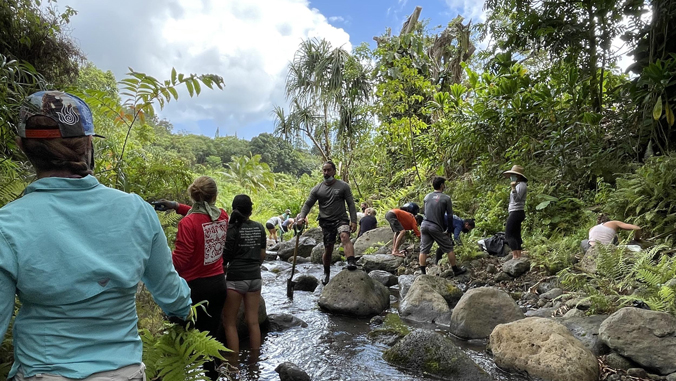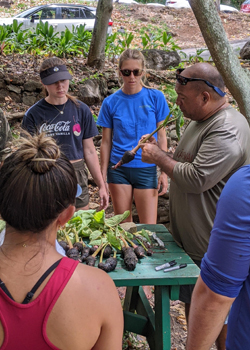
A novel graduate course focused on place-based research developed by University of Hawaiʻi at Mānoa faculty was awarded a grant of more than $495,000 from the National Science Foundation Innovations in Graduate Education program. The award will help faculty expand upon this work for the next three years.
The course, Kūlana Noiʻi: Introduction to Place-based Research Methodologies in Hawaiʻi, was piloted in 2021 as part of the Marine Biology Graduate Program (MBGP) at UH Mānoa. It begins with a two-week intensive training program and continues into the fall semester, aimed to provide students with a grounding in what constitutes a research paradigm and the knowledge and skills necessary to conduct place-based research in Indigenous spaces with a focus on Hawaiʻi.

“When students enter MBGP, they typically lack formal training in multiple knowledge systems and appreciation of the cultural context in which they undertake their scientific research,” said Megan Donahue, acting director of the Hawaiʻi Institute of Marine Biology (HIMB) and co-director of MBGP. “This course introduces students to the historical, social, and cultural context of Hawaiʻi and exposes students to place-based methodologies and community-based research.”
Through partnership with the Heʻeia National Estuarine Research Reserve (HeNERR), the first week of the course focuses on the Heʻeia ahupuaʻa (land division), while the second week connects students with other communities undertaking biocultural restoration and research around Oʻahu.
“By valuing the communities and knowledge systems of places where our students work, the course promotes an alignment of the graduate program culture to the communities,” said Rosie Alegado, lead instructor and co-principal investigator. “This approach also strives to create a more welcoming environment for local and Indigenous students, thereby supporting a long-range plan to increase recruitment and retention of students with diverse backgrounds.”
Building community relationships
Kūlana Noiʻi outlines a set of ideas, values and behaviors that, when applied alongside hard work, can build more just and generative relationships between researchers and community. This framework centers the essential interdependence of people and ecosystems as foundational to place-based learning. The Ulana ʻIke Center of Excellence at the UH Sea Grant College Program (Hawaiʻi Sea Grant) has worked for the last six years to provide professional development and training for students and faculty within the UH System focused on the Kūlana Noiʻi framework.
One student who completed the course said, “I feel a strong connection to my cohort as well as the program and this place. I would have never felt that without this course. I think the connections I made in the program will matter throughout my graduate career.”
Crossing disciplines
In addition to supporting the continued training of MBGP students and curriculum development, the grant provides the opportunity for principal investigators Donahue, Alegado, Shimi Rii, Fred Reppun and Monica Stitt-Bergh to work with faculty in other programs on campus to help them develop analogous courses tailored to their disciplines.
“Grounding our curriculum in an ethical framework promotes reciprocal engagement and knowledge co-production with communities wherever these emerging researchers do their work, and changes the culture of graduate education as UH Mānoa aspires to be an Indigenous place of learning,” said Donahue.
This course reflects the collaboration of instructors from diverse and intersecting units across campus: Alegado (oceanography/Hawaiʻi Sea Grant), Katy Hintzen (Hawaiʻi Sea Grant), Rii (HIMB/HeNERR), Reppun (HIMB/HeNERR), Celia Smith (School of Life Sciences/MBGP) and Donahue (HIMB/MBGP).

